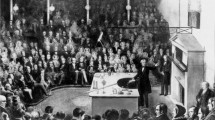Abstract
In modern schooling, student activity and group work are emphasized as important vehicles for learning. Following the perspectives formulated by Piaget and other constructivist thinkers, self-discovery by students of scientific principles is seen as a means for avoiding the pitfalls ascribed to teacher centered lecturing. Teacher explanation in this pedagogical philosophy is often seen as counterproductive to real learning. In the study reported, it is illustrated by means of an example from student group work in a physics laboratory how the understanding of basic principles of optics do not follow from mere observation and physical manipulation of a particular type of educational instrument; the optical bench. It is argued that the optical bench itself is a product of a specific theory of optics and that it embodies principles of understanding the word which are discursive in nature and which are not accessible to learners unless they are provided guidance. In the instance analyzed, students already in some sense had an understanding of the principles illustrated (e.g., that light can only go straight forward, that it cannot go through solid objects, etc.), but they failed to realize the significance of these observations, since they fere not familiar with a theoretical position in which these observations called for an explanation. ‘Seeing’, also in the case of the optics laboratory, relies on the use of cultural tools that provide the observer with relevant contextualizations.
Similar content being viewed by others
References
Bergqvist, K. (1990). Doing schoolwork. Task premisses and joint activity in the comprehensive classroom.Linköping Studies in Arts and Science, 55. University of Linköping.
Bower, G., & Hilgard, E. H. (1981).Theories of learning (5th ed.) Englewood Cliffs, NJ.: Prentice Hall.
Edwards, D. (1993). Concepts, memory, and the organization of pedagogic discourse: A case study.International Journal of Educational Research, 19, 205–225.
Edwards, D., & Mercer, N. (1987).Common knowledge. The development of understanding in the classroom. London: Methuen.
Feldman, D. H. (1980).Beyond universals in cognitive development. Norwood, NJ.: Ablex.
Halldén, O. (1982).Elevernas tolkning av skoluppgiften (The students' interpretation of the school task). Stockholm: Pedagogiska institutionen.
Ogr 80. (1980).Läroplan för grundskolan. Allmän del. (The compulsory school curriculum. General section). Stockholm: Liber.
Marton, F., Dall'Alba, G., & Beauty, E. Conceptions of learning.International Journal of Educational Research, 19, 277–300.
Piaget, J. (1972).Oú va l'education? Comprendre, c'est inventer. (Where is education going? To understand is to invent). Paris: Unesco
Piaget, J. (1983). Plaget's theory. In P. M. Mussen (Ed.),Handbook of child psychology (Vol. 1) (4th ed.) (pp. 103–128). New York: Wiley.
Richardson, G. (1983).Drömmen om en ny skola. Idéer och realiteter i svensk skolpolitik 1945–1959 (The dream of a new school. Ideas and realities in Swedish educational policy 1945–1959). Stockholm: Liber/Allmänna förlaget.
Rogoff, B. (1990).Apprenticeship in thinking. New York: Oxford University Press.
Säljö, R. (1992). Human growth and the complex society: The monocultural bias of theories of learning.Cultural Dynamics, 5, 34–56.
Walkerdine, V. (1984). Developmental psychology and the child-centered pedagogy: the insertion of Piaget into early education. In J. Henriques, W. Hollway, C. Urwin, C. Venn, & V. Walkerdine (Eds.),Changing the subject: Psychology, social regulation and subjectivity (pp. 153–202). London: Methuen.
Wistedt, I. (1987).Rum for lärende (Latitude for learning). Stockholm: Pedagogiska institutionen.
Vygotsky, L. S.: (1986).Thought and language. (Trans. A Kuzolin). Cambridge, MA: MIT-Press.
Wertsch, J. (1985).Vygotsky and the social formation of mind. Cambridge, MA: Harvard University Press.
Wertsch, J. (1991).Voices of the mind. Cambridge, MA: Harvard University Press.
Author information
Authors and Affiliations
Additional information
The research reported here has been financed by grant from the Swedish Council for Research in the Humanities and Social Sciences to Roger Säljö.
Rights and permissions
About this article
Cite this article
Bergqvist, K., Säljö, R. Conceptually blindfolded in the optics laboratory. Dilemmas of inductive learning. Eur J Psychol Educ 9, 149 (1994). https://doi.org/10.1007/BF03173550
Received:
DOI: https://doi.org/10.1007/BF03173550




